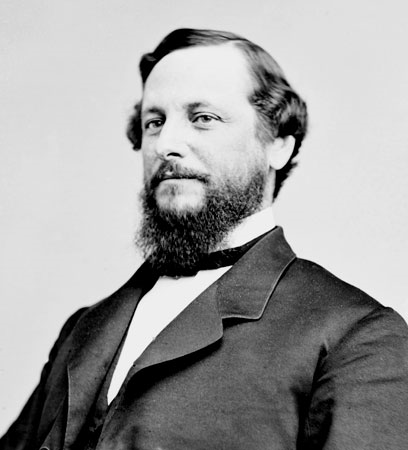
George H. Pendleton
George Hunt Pendleton (July 19, 1825 – November 24, 1889)[1] was an American politician and lawyer. He represented Ohio in both houses of Congress and was the unsuccessful Democratic nominee for Vice President of the United States in 1864.
George H. Pendleton
Edwin Armstrong
Adam Riddle
John Vattier
Stanley Matthews
George Holmes
William Converse
November 24, 1889 (aged 64)
Brussels, Belgium
Alice Key
Jane Frances Hunt Pendleton
Nathanael Greene Pendleton
Francis Scott Key (father-in-law)
After studying at the University of Cincinnati and Heidelberg University in Europe, Pendleton practiced law in his home town of Cincinnati, Ohio. He was the son of Congressman Nathanael G. Pendleton and the son-in-law of poet Francis Scott Key. After serving in the Ohio Senate, Pendleton won election to the United States House of Representatives. During the Civil War, he emerged as a leader of the Copperheads, a group of Democrats who favored peace with the Confederacy.[2] After the war, he opposed the Thirteenth Amendment and the Civil Rights Act of 1866.
The 1864 Democratic National Convention nominated a ticket of George B. McClellan, who favored continuing the war, and Pendleton, who opposed it. The ticket was defeated by the National Union ticket of Abraham Lincoln and Andrew Johnson, and Pendleton's term as a Congressman expired shortly thereafter. Pendleton was a strong contender for the presidential nomination at the 1868 Democratic National Convention, but was defeated by Horatio Seymour. After Pendleton lost the 1869 Ohio gubernatorial election, he temporarily left politics.
He served as the president of the Kentucky Central Railroad before returning to Congress. Pendleton won election to the U.S. Senate in 1879 and served a single term, becoming Chairman of the Senate Democratic Conference. After the assassination of President James A. Garfield, he wrote and helped pass the Pendleton Civil Service Reform Act of 1883. The act required many civil service hires to be based on merit rather than political connections. Passage of the act lost him support in Ohio and he was not nominated for a second term in the Senate. President Grover Cleveland appointed him as the ambassador to the German Empire. He served in that position until 1889, dying later that same year.
Early life[edit]
Pendleton was born in Cincinnati on July 19, 1825. He was the son of Jane Frances (née Hunt) Pendleton (1802–1839) and U.S. Representative Nathanael Greene Pendleton (1793–1861).[3]
He attended the local schools and Cincinnati College and the University of Heidelberg in Germany. Pendleton studied law and was admitted to the bar in 1847 and commenced practice in Cincinnati.[4]
In popular culture[edit]
In Steven Spielberg's 2012 film, Lincoln, Pendleton is played by Peter McRobbie and portrayed as one of the most notable opponents of the Thirteenth Amendment and of the Civil Rights Act of 1866.